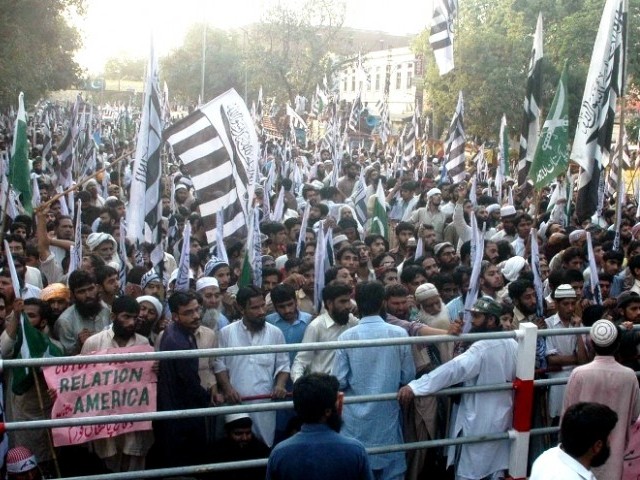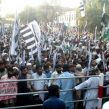
Pakistan’s Jamaat-ud-Dawa Steps Up Campaign of Anti-American Rhetoric
Publication: Terrorism Monitor Volume: 9 Issue: 28
By:

Despite the Pakistan government’s proscription, the Islamic charity Jamaat-ud-Dawa (JuD) has stepped up its overt anti-Indian and anti-Western rhetoric, holding mass protest rallies across Pakistan as its leaders continue to give provocative speeches in various public forums to fuel Jihadi sentiments and threaten Indian and Western interests in the region. The JuD is believed to act as a front organization for the Lashkar-e-Taiba terrorist group, responsible for the 2008 assault on Mumbai.
Following the death of al-Qaeda leader Osama bin Laden, hundreds of JuD activists descended into the streets of Pakistan’s main cities, including Karachi and Lahore, to offer special “funerary prayers in absentia” (ghaibana namaz-e-janaza) in early May and to pronounce Bin Laden a martyr (The News (Islamabad) May 4). Days later, scores of JuD activists joined members of other Islamic radical groups to organize a rally in Karachi of the Tahaffuz-e-Harmain Sharfain (“Defense of the Two Noble Sanctuaries,” i.e. Mecca and Madinah), a movement in defense of holy mosques in Saudi Arabia led by a group of radical Pakistani clerics. The rally was intended to support the government of Saudi Arabia against “conspiracies” hatched against the Kingdom by the United States and its allies (Daily Times [Lahore], May 7).
On June 20, JuD organized a similar campaign under the auspices of a radical pressure group known as the Dafaye Pakistan Forum (Defense of Pakistan Forum), bringing out a ten-point declaration at an event held in the Jamia al-Dirasat Islamia seminary in Karachi. The declaration described the United States as an enemy of Pakistan and warned India against any military adventures that would threaten Pakistan. During this event, JuD leaders Amir Hamza and Abdul Rhaman Makki joined leaders of Ahle Sunnat wa’l-Jamaat and Jamaat-e-Islami in calling for the imposition of an “Islamic system” in Pakistan. The JuD leaders also asked India to hand over Hindu radicals suspected in the 2007 India–Pakistan Samjhauta Express train bombing, in which nearly 70 people (mostly of Pakistan origin) were killed (Express Tribune [Karachi], June 22).
The JuD (formerly known as Markaz Dawa wa’l-Irshad) was founded in Lahore, Pakistan in the mid-1980s with an Ahle Hadith (Wahhabi) orientation. JuD has long been known to be a front for the terrorist group Lashkar-e-Taiba (LeT), the perpetrator of numerous attacks against India, including the November 2008 Mumbai episode. The Islamabad government launched a brief military operation against JuD/LeT hideouts and training camps in the early weeks of December 2008 under pressure from the United States and India, arresting many top operatives, including Hafiz Saeed and Zaki-ur-Rehman Lakhvi, the masterminds of the November 2008 Mumbai attacks (for more on Saeed see Militant Leadership Monitor, June 2010). Hafiz Saeed was later released from detention for lack of evidence and continues to make incendiary high-profile speeches with apparent impunity.
Pakistani Interior Minister Rehman Malik recently told Indian journalists that Pakistan is willing to arrest Saeed if India can provide proof of his involvement in the Mumbai attacks: “We detained him but the court asked us to let him go. Law does not go by statements but evidence. If we are provided actionable evidence, we will act against him” (The Hindu, June 29).
In a recent Urdu-language interview, Hafiz Saeed questioned the sincerity of India in solving the Kashmir issue (Khabrain [Islamabad], June 24). To mark Kashmir Solidarity Day last February, Saeed openly threatened to launch a ghazwa-e-hind (battle against India) unless India quits Jammu and Kashmir. He also described the UN as a “slave to the United States.”
In early July, Saeed raised the issue of India’s dam building efforts on the Himalayan rivers that are expected to create massive environmental, economic and cultural change as well as displace hundreds of thousands of people. At the same time, Saeed accused India of using dialogue with Pakistan as a weapon to consolidate military occupation in Kashmir (Nawa-i Waqt [Rawalpindi], July 1). India has been linking the resumption of the dialogue process with the prosecution of the perpetrators of the 2008 Mumbai attacks, including Hafiz Saeed.
While continuing his tirades against India, Israel and the United States, Hafiz Saeed has also attempted to use Pakistan’s legal system to halt U.S. drone attacks in Pakistan’s tribal areas, ostensibly riding on a wave of anti-American sentiment across Pakistan. In June, Saeed filed a petition in the Lahore High Court (LHC) requesting the implementation of the parliamentary resolution passed on May 14 against drone strikes (Express Tribune, June 21). According to the resolution, the United States is to be warned that unless drone strikes cease, supplies to Afghanistan-based NATO forces passing through Pakistan will be cut (The Nation [Lahore], June 25). The government remains tight lipped about the matter so far, but in the meantime, the LHC extended the deadline for the Pakistan government to reply to the petition until July 13 (The News [Islamabad], July 8).
The LHC has also sought a reply from the government’s Foreign Ministry about another petition moved by Saeed in January this year, seeking government assistance to defend himself in the Mumbai attack case in an American court. Saeed has been named in a lawsuit brought by the son of two U.S. nationals who were killed in the Mumbai assault, Rabbi Gabriel Noah Holtzberg and his wife Rivka Holtzberg. Also named in the suit are current ISI chief Lieutenant General Ahmed Shuja Pasha, former ISI chief Nadeem Taj, and two other men alleged to be current or former ISI officers, Major Iqbal and Major Sameer Ali. While the ISI personnel have received legal support from Islamabad, Saeed has been denied the same assistance. Saeed argued in his petition that all citizens are considered equal under the Pakistani constitution and he should receive the same assistance as the ISI officers (The News, July 1; The Express Tribune, July 1). The JuD has alleged the case against Hafiz Saeed is part of a political conspiracy with no legal credibility. The LHC has directed the Foreign Ministry to file a response in this regard by September 20 (The News, July 1).
The JuD’s firebrand chief Hafiz Saeed and his close associate Amir Hamza often dare the Pakistani establishment to take action against them, touting their public support base and the lack of terrorist evidence against them in either Pakistan or in India. Despite the JuD being placed on the U.S. list of terrorist groups in 2006 and the United Nations’ list of terrorist organizations in 2008, the JuD sees no impact from these designations on their operations. Amir Hamza has pointed out several times that Pakistan’s legal system has cleared their names time and time again while emphasizing the support the JuD still garners in Pakistan for their humanitarian works, such as disaster relief. Interestingly, the Pakistan government continues to ignore the JuD’s provocations, giving no indication that further moves against the group are pending.





